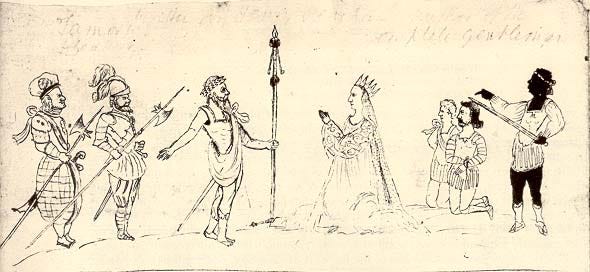“Religiously they ask a sacrifice” – Alarbus is disembowelled and burned in Titus Andronicus
Horror Moments, Shakespeare Edition
‘Horror Moments’ is a series examining horror-inflected scenes and themes in unexpected places. The ‘moments’ are published weekly on Thursday mornings, and I share bonus content on the history of magic, theatre, storytelling, and more on Monday afternoons – don’t forget to subscribe!
[Spoilers: Titus Andronicus (1592), The Wicker Man (1973), Midsommar (2019)]
And so we have arrived.
The final four (count them, four) articles in this Shakespearean edition of ‘horror moments’ are all from the same play, the outrageously violent revenge tragedy Titus Andronicus (1592).
When I was a PhD student and was given some teaching on the undergraduate Shakespeare module, I tried several times to get Titus on the syllabus but the professor in charge understandably hated the play.
It’s so relentlessly grisly that it was habitually excised from the canon by Victorian scholars, many of whom refused to believe that The Bard could have written something quite so dripping with sadism. Filled with sexualised and racialised violence, Titus perhaps seems more trouble than its worth in a classroom environment, although your trigger warnings can just read ‘you name it.’
Our first ‘moment’ comes from the opening scene of the play as we are introduced to the main figures in what will become a devastating cycle of revenge.
Titus Andronicus himself is a seasoned Roman general who has won a war against a German tribe, the Goths, but has lost twenty-one of his twenty-five sons in the process. As he brings their bodies home for burial, a clutch of frightened prisoners of war are paraded through the streets of Rome in chains. Amongst them are Tamora, queen of the Goths, and her three sons (all young adults): Alarbus, Chiron, and Demetrius.
As the tomb is opened and the dead Roman brothers are laid to rest the eldest surviving son, Lucius, asks his father for a human sacrifice:
LUCIUS
Give us the proudest prisoner of the Goths,
That we may hew his limbs, and on a pile
Ad manes fratrum [‘to the shades of our brothers’] sacrifice his flesh,
Before this earthy prison of their bones;
That so the shadows be not unappeased,
Nor we disturb'd with prodigies on earth.
To the Romans, this is a reasonable request and seemingly a matter of tradition, so Titus says:
TITUS ANDRONICUS
I give him you, the noblest that survives,
The eldest son of this distressed queen.
And then Tamora, this same ‘distressed queen,’ gets an absolutely spine-tingling speech that blazes with maternal fury:
TAMORA
Stay, Roman brethren! Gracious conqueror,
Victorious Titus, rue the tears I shed,
A mother's tears in passion for her son:
And if thy sons were ever dear to thee,
O, think my son to be as dear to me!
Sufficeth not that we are brought to Rome,
To beautify thy triumphs and return,
Captive to thee and to thy Roman yoke,
But must my sons be slaughter'd in the streets,
For valiant doings in their country's cause?
O, if to fight for king and commonweal
Were piety in thine, it is in these.
Andronicus, stain not thy tomb with blood:
Wilt thou draw near the nature of the gods?
Draw near them then in being merciful:
Sweet mercy is nobility's true badge:
Thrice noble Titus, spare my first-born son.
To me this is one of Shakespeare’s most underrated speeches, particularly for a female character. We’ve only just met her but we can hear immediately how uncharacteristically desperate she sounds, how fuelled by panic every question is, how plaintively she is prepared to grovel before her captor to save her son’s life despite her former pride and stoicism. She has fallen a long way from being a feared and respected queen in her own right but she loves her son more than she loathes the humiliation. She will remember the fact that Titus made her beg like this.
Unless you’re a psychopath, you’re probably sitting in the audience hoping this plea has worked. Titus answers:
TITUS ANDRONICUS
Patient yourself, madam, and pardon me.
These are their brethren, whom you Goths beheld
Alive and dead, and for their brethren slain
Religiously they ask a sacrifice:
To this your son is mark'd, and die he must,
To appease their groaning shadows that are gone.
And as her boy is dragged away to be disembowelled and burned all Tamora can manage is a bitter cursing cry against the horror of this Roman ritual:
TAMORA
O cruel, irreligious piety!
And so the first blood spills, the first carcass is carved up and burned in the ritual fire. The remaining prisoners quake with the fury of grief and injustice.
But what harm can they do? They have lost everything and are prisoners of Rome.
The story might have ended there except that at the end of this first scene Tamora, who is probably only in her thirties despite having sons in their teens/early twenties, catches the eye of the new emperor, Saturninus. To Titus’ horror and astonishment, he announces that she will be his new empress and suddenly the prisoner whose son he has just murdered is the most powerful woman in Rome.
Saturninus makes them promise to let bygones be bygones and Tamora agrees, but in an aside she says with chilling surety:
I'll find a day to massacre them all.
Human sacrifices are an interesting kind of death in horror films because they are typically committed in cold blood and usually happen with the consent or even encouragement of a social unit. This is often what makes them so scary: it feels like everyone other than the offering themselves has gone insane and there is no recourse, no law or order to appeal to.
Like the death of Alarbus, the sacrifice at the end of The Wicker Man is done in broad daylight and for the good of a community who will make themselves deaf to all pleas and screams because they believe this death is necessary for a greater good. Sergeant Howie is the ‘right kind of adult’ for the task, just as Alarbus, as the ‘proudest prisoner,’ makes the most fitting offering. In The Wicker Man, Lord Summerisle takes the time to explain the rationale of what is going on, lest the victim take it personally, just as Titus apologises to Tamora that ‘religiously’ his sons have asked him for her son’s life.
The 2019 film Midsommar superficially has a lot in common with The Wicker Man, being another story about an imagined pagan community which sacrifices people to guarantee a fruitful harvest, but a huge point of difference is the introduction of a revenge theme. Although ostensibly a religious sacrifice, the climactic death is in fact a moment of vengeful catharsis for a wronged protagonist who has the dubious good fortune of being suddenly given the power to sacrifice those who have hurt her.
The close-up of Dani’s grinning face as she watches her ex-boyfriend burn strikes a completely different tone than the joyful communal singing of The Wicker Man. If the Summerisle sacrifice was carried out with the same ‘piety’ as the killing of Alarbus, the ending of Midsommar has more in common with the gleeful plots of Tamora to ‘massacre them all’ when she is suddenly made empress as Dani, an outsider, is unexpectedly crowned the Queen of May.
From a storytelling perspective, a huge difference between these films and Shakespeare’s goriest play is that his scene of sacrifice is right at the beginning rather than right at the end. The dubious morality of this kind of pious execution is the flaw in Titus’ worldview that kickstarts the rest of the complex narrative as the two sides of this original dispute seek crueller and crueller retribution. No one gets away with sacrifice in Titus, whether Alarbus’ death really was a dispassionate ritual or whether Lucius and the other Romans wanted deep down to savour watching one of their ‘proud prisoners’ feed the temple fire.
One man’s sacrifice is another man’s murder, but for Tamora and her remaining sons, Chiron and Demetrius, there can be no ambiguity, no moral relativism to excuse the actions of their captors. The war was over, the battle was won, Alarbus did not need to die — and now they have the power to avenge him. The flames have died down but brace yourselves, the horror has only just begun.
Until next week, happy nightmares everyone!
Horror moments are posted every Thursday and a wide variety of articles exploring the history of magic, theatre, storytelling, and more are published on Monday afternoons.








That's a fascinating article. Excellent commentary and dot connecting. Titus Andronicus is one of my favorite Shakespeare plays (though I think I'm in the minority on that).
Oh, Midsommer. I can't unsee any of the horror, and I don't want to.